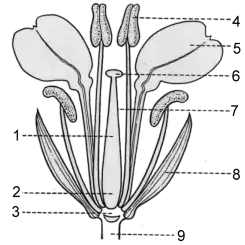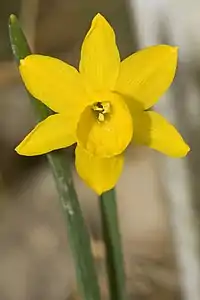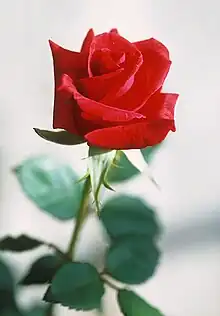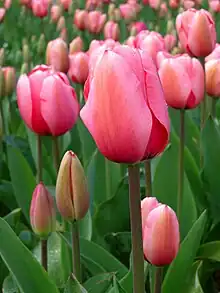flower
See also: Flower
English

Pink cactus flowers in bloom.
| Picture dictionary |
|---|
Alternative forms
- flowre (obsolete)
Etymology 1
From Middle English flour, from Anglo-Norman flur, from Latin flōrem, accusative of flōs, from Proto-Italic *flōs, from Proto-Indo-European *bʰleh₃- (“to thrive, bloom”). Doublet of flour.
Partly displaced native Old English blostma, whence Modern English blossom.
Pronunciation
- (Received Pronunciation) IPA(key): /ˈflaʊ.ə/
Audio (UK) (file) - (General American, Canada) IPA(key): /ˈflaʊ.ɚ/
Audio (US) (file) Audio (AU) (file) - Rhymes: -aʊ.ə(ɹ)
- (Indian English)IPA(key): /flaː(r)/, /flɐ.ʋə(r)/, /flɐ.wə(r)/
- Homophone: flour (for people who pronounce flower as one syllable, or flour as two)
Noun
flower (countable and uncountable, plural flowers)
- A colorful, conspicuous structure associated with angiosperms, frequently scented and attracting various insects, and which may or may not be used for sexual reproduction.
- 1653, William Basse, “Clio, or The First Muse; in 9 Eglogues in Honor of 9 Vertues. As It was in His Dayes Intended. [Munday. Laurinella. Eglogue. Of True and Chast Love.]”, in J[ohn] P[ayne] C[ollier], editor, The Pastorals and Other Workes of William Basse. […] (Miscellaneous Tracts, Temp. Eliz. & Jac. I), [London: s.n.], published 1870, →OCLC:
- O Laurinella! little doſt thou wot / How fraile a flower thou doſt ſo highly prize: / Beauty's the flower, but love the flower-pot / That muſt preſerve it, els it quickly dyes.
- 1954 July 29, J[ohn] R[onald] R[euel] Tolkien, “A Long-Expected Party”, in The Fellowship of the Ring: Being the First Part of The Lord of the Rings, New York, N.Y.: Ballantine Books, published September 1973, →ISBN:
- The flowers glowed red and golden: snapdragons and sunflowers, and nasturtians trailing all over the turf walls and peeping in at the round windows.
- (botany) A reproductive structure in angiosperms (flowering plants), often conspicuously colourful and typically including sepals, petals, and either or both stamens and/or a pistil.
- 1894, H. G. Wells, The Flowering of the Strange Orchid:
- You know, Darwin studied their fertilisation, and showed that the whole structure of an ordinary orchid flower was contrived in order that moths might carry the pollen from plant to plant.
- A plant that bears flowers, especially a plant that is small and lacks wood.
- We transplanted the flowers to a larger pot.
- The stem of a flowering plant with the blossom or blossoms attached, used for decoration, as a gift, etc.
- He always keeps a vase full of flowers in his office.
- (uncountable, usually with in) Of plants, a state of bearing blooms.
- The dogwoods are in flower this week.
- (euphemistic, hypocoristic) The vulva, especially the labia majora.
- 1749, [John Cleland], “(Please specify the letter or volume)”, in Memoirs of a Woman of Pleasure [Fanny Hill], London: […] G. Fenton [i.e., Fenton and Ralph Griffiths] […], →OCLC, page 106:
- [F]or ſtill, that my virgin-flower was yet uncrop'd never once enter'd into his head, and he would have thought it idling with time and words to have queſtion'd me upon it.
- The best examples or representatives of a group.
- 1513, John Skelton, Agaynst the Scottes; republished in John Scattergood, editor, John Skelton: The Complete English Poems, 1983, →OCLC, page 116, lines 25–28:
- At Floddon hyllys, / Our bowys, our byllys / Slew all the floure / Of theyr honoure.
- 1594–1597, Richard Hooker, edited by J[ohn] S[penser], Of the Lawes of Ecclesiastical Politie, […], London: […] Will[iam] Stansby [for Matthew Lownes], published 1611, →OCLC, (please specify the page):
- The choice and flower of all things profitable the Psalms do more briefly contain.
- 1808, Robert Southey, Chronicle of the Cid, from the Spanish:
- the flower of the chivalry of all Spain
- 1915, Katharine Tynan, The Golden Boy:
- In times of peace, so clean and bright, / And with a new-washed morning face, / He walked Pall Mall, a goodly sight, / The finished flower of all the race.
- The best state of things; the prime.
- She was in the flower of her life.
- 1842, Alfred Tennyson, “Lady Clara Vere de Vere”, in Poems. […], volume I, London: Edward Moxon, […], →OCLC, stanza 2, page 156:
- A simple maiden in her flower / Is worth a hundred coats-of-arms.
- 1899, James [Mackintosh] Kennedy, “To Queen Alexandra”, in The Scottish and American Poems of James Kennedy, J[ohn] S[tuart] Ogilvie Publishing Company, […], page 197:
- NO lady fair in hall or bower, / In days when knighthood was in flower, / Or high-born dame with jewels set, / Or Tudor or Plantagenet, / E’er wore enwreath’d on form and face / Thy royal robe of richest grace.
- (obsolete) Flour.
- 1731, John Arbuthnot, “Of the Different Intentions to be Pursued in the Choice of Aliment in Different Constitutions”, in An Essay Concerning the Nature of Aliments, and the Choice of Them, According to the Different Constitutions of Human Bodies. […], 1st Irish edition, Dublin: […] S. Powell, for George Risk, […], George Ewing, […], and William Smith, […], →OCLC, prop[osition] VII, page 86:
- The Flovvers of Grains mix'd vvith VVater vvill make a ſort of Glue.
- (in the plural, chemistry, obsolete) A substance in the form of a powder, especially when condensed from sublimation.
- the flowers of sulphur
- 1661, Robert Boyle, “(please specify the page)”, in The Sceptical Chymist: or Chymico-physical Doubts & Paradoxes, […], London: […] J. Cadwell for J. Crooke, […], →OCLC:
- Exposed to a moderate fire in subliming pots, [brimstone] rises all into dry, and almost tasteless, flowers; whereas being exposed to a naked fire, it affords store of a saline and fretting liquor.
- A figure of speech; an ornament of style.
- (printing) Ornamental type used chiefly for borders around pages, cards, etc.
- 1841, William Savage, A Dictionary of the Art of Printing:
- I pointed out to the late Mr. Catherwood, of the firm of Caslon and Catherwood, the inconvenience of both these modes of cutting flowers,
- (in the plural, obsolete) Menstrual discharges.
- 1611, The Holy Bible, […] (King James Version), London: […] Robert Barker, […], →OCLC, Leviticus 15:24:
- And if any man lye with her at all, and her flowers be vpon him, hee shall be vncleane seuen dayes: and all the bed whereon he lyeth, shall be vncleane.
- A delicate, fragile, or oversensitive person.
- 2015, Sally Chiwuzie, Silent Symphonies:
- […] she whispered leaning over and kissing her forehead; and then added, 'Mummy loves you, precious flower.'
- 2016, Barbara Ann Wright, Paladins of the Storm Lord:
- “Take care of yourself out there, Brown, you delicate flower.”
- 2021, Alica McKenna-Johnson, The Unicorn's Scion:
- “Come on, you delicate flower, we just need to nap. It will be fine.”
- (Can we verify(+) this sense?) Credit, recognition.
- to give someone his flowers
Usage notes
- In its most common sense as "a colorful conspicuous structure", the word flower includes many structures which are not anatomically flowers in the botanical sense. Sunflowers and daisies, for example, are structurally clusters of many small flowers that together appear to be a single flower (a capitulum, a form of pseudanthium), but these are considered to be flowers in the general sense. Likewise, the botanical definition of flower includes many structures that would not be considered a flower by the average person, such as the catkins of a willow tree or the downy flowers found atop a cattail stalk.
Synonyms
- (inflorescence that resembles a flower): head, pseudanthium
- (best examples): cream
- (best state of things): prime
Derived terms
- animal flower
- arcigera flower moth
- Bach flower remedy
- Bach flower therapy
- ball-flower
- ball flower
- balloon flower
- bat flower
- Bill Gates' flower fly
- blanket flower
- bone-eating snot flower worm
- burst into flower
- butter flower
- cardinal flower
- carrion flower
- chocolate flower
- Christmas flower
- composite flower
- cone-flower
- cone flower
- corkscrew flower
- crown flower
- Easter flower
- egg flower soup
- electric flower car
- everlasting flower
- fennel-flower
- firecracker flower
- flamingo flower
- flannel flower
- flower arrangement
- flower-bearing
- flower bed
- flower beetle
- flower bond
- flower box
- flower bug
- flower car
- flower chafer
- flower child
- flower clock
- flower delice
- flower-de-luce
- flower deluce
- flower-fence
- flower-fly
- flower fly
- flower garden
- flower-gentle
- flower head
- flower hoe
- flower longhorn
- flower mantis
- flower moon
- flower moth
- Flower Mound
- flower-of-an-hour
- flower of Jove
- flower of the flock
- flower-petal
- flower petal
- flower power
- flower service
- flower sticks
- flower-strewn
- flower-sweet
- flower wall
- flower water
- flower weevil
- four o'clock flower
- four-o'clock flower
- frost flower
- gall flower
- gilli-flower
- gilly-flower
- honey flower
- hothouse flower
- incomplete flower
- in flower
- inside-out flower
- in the flower of one's youth
- Joseph's flower
- July-flower
- lantern flower
- leopard flower
- luxuriant flower
- moccasin flower
- monkey-flower
- noon-flower
- pagoda flower
- paper flower
- paschal flower
- pasque flower
- passion-flower
- Passion flower
- passion flower
- Paul Allen's flower fly
- peacock flower
- pelican flower
- pencil flower
- pineapple flower
- pompon flower
- red cardinal flower
- red flower
- red princess flower
- rice flower
- Rogation-flower
- savanna flower
- savannah flower
- shoe flower
- sleep-flower
- sleep flower
- state flower
- tiger flower
- treasure flower
- trigger flower
- trumpet flower
- Tudor flower
- united flower
- velvet flower
- Venus's flower basket
- wall-flower
- wall flower
- wishbone flower
- wood-shaving flower
Translations
reproductive structure in angiosperms
| ||||||
plant that bears flowers, especially a plant that is small and lacks wood
|
Verb
flower (third-person singular simple present flowers, present participle flowering, simple past and past participle flowered)
- (intransitive) To put forth blooms.
- This plant flowers in June.
- (transitive) To decorate with pictures of flowers.
- (intransitive) To reach a state of full development or achievement.
- 1579, Immeritô [pseudonym; Edmund Spenser], “December. Ægloga Duodecima.”, in The Shepheardes Calender: […], London: […] Hugh Singleton, […], →OCLC; republished as The Shepheardes Calender […], London: […] Iohn Wolfe for Iohn Harrison the yonger, […], 1586, →OCLC:
- when flowr'd my youthful spring
- 1940 Mahadev Desai, translator, Mahatma Gandhi, An Autobiography, Part III (IX) The Story of My Experiments with Truth/Part III/Simple Life, original published 1927-1929
- It only needed watering to take root, to flower and to fructify, and the watering came in due course.
- 2012, Naomi Wolf, Vagina: A New Biography, page 43:
- In life after life of this now-expanded circle of women artists, writers and revolutionaries, the same appeared: a flowing of creative insight and vision seemed the follow a sexual flowering.
- (archaic, intransitive) To froth; to ferment gently, as new beer.
- 1631, Francis [Bacon], “(please specify |century=I to X)”, in Sylua Syluarum: Or A Naturall Historie. In Ten Centuries. […], 3rd edition, London: […] William Rawley; [p]rinted by J[ohn] H[aviland] for William Lee […], →OCLC:
- That beer did flower a little.
- (intransitive) To come off as flowers by sublimation.
- [1644], [John Milton], Of Education. To Master Samuel Hartlib, [London: […] Thomas Underhill and/or Thomas Johnson], →OCLC:
- observations which have flowered off
Derived terms
Translations
to put forth blooms
|
Derived terms
Related terms
See also
- Category:Flowers
Alternative forms
- flow-er
Noun
flower (plural flowers)
- (rare) Something that flows, such as a river.
- 1886–1890, J. D. Rees, Narratives of Tours in India, page 340:
- Leaving the weavers’ village behind you, and crossing the sandy bed of the Vengavati or ‘Swift-flower,’ which, however, contained not a drop of water, you reach the ancient Jain temple.
- 1888, John T. White, The Seventh Book of Cæsar’s Gallic War with a Vocabulary, page 224:
- Rhŏdănus, i, m. The Rhodanus (now Rhone); a river of Gaul [prob. a northern word, meaning “Swift-flower or Swift-passer”].
- 1893, Arthur A. MacDonnell, A Sanskrit-English Dictionary, page 340:
- sará-yu, f. [swift flower: √sri] N. of a river (in Oudh), in C. gnly. û.
- 1959, Scottish Studies, volumes 3-4, page 92:
- one that flows with force and speed; the fast flower
- 2019 August 24, Radio Times Crossword:
- Bonnie partner with Scottish flower (5) [as a clue for CLYDE]
- 1886–1890, J. D. Rees, Narratives of Tours in India, page 340:
Usage notes
- The term is used with this meaning almost exclusively in cryptic crossword clues, where it generally stands in for the name of a specific river.
Cebuano
Noun
flower
- someone who is allowed to participate in games but cannot become it; usually a younger sibling of a player who may or may not fully grasp the mechanics of the game
- (mahjong) flower or season tile
- (mahjong) act of declaring and revealing a flower or season tile and in order drawing a replacement tile
Middle English
This article is issued from Wiktionary. The text is licensed under Creative Commons - Attribution - Sharealike. Additional terms may apply for the media files.






